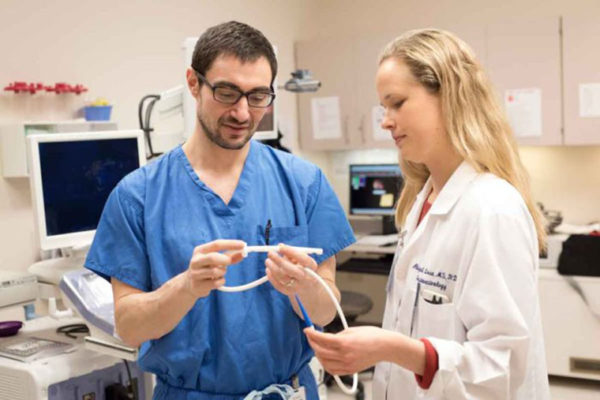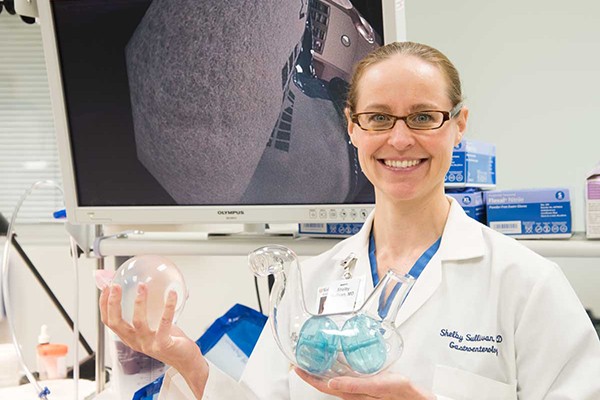New weight-loss therapy rids body of food before digestion
A new weight-loss therapy offers significantly overweight people a means to rid their bodies of some of what they eat before excess calories can be absorbed. Called aspiration therapy, the FDA-approved, nonsurgical therapy was developed by researchers at the School of Medicine and is available at Barnes-Jewish West County Hospital.
New for weight loss: balloon therapy
Washington University School of Medicine in St. Louis and Barnes-Jewish West County Hospital are offering a newly approved, nonsurgical therapy to help people lose weight. Shelby Sullivan, MD, holding models of the two systems being used, said the therapy involves placing special balloons into the stomach and inflating them to give patients the feeling of being full after eating small meals.
Study asks whether healthy diet or weight loss makes you live longer
Researchers at Washington University School of Medicine in St. Louis are recruiting volunteers for a study comparing the potential health and longevity benefits of the Mediterranean diet with those of a typical American diet. The study’s aim is to determine whether health and longevity are influenced more by healthy eating or by weight loss.
Lifestyle changes for obese patients linked to modest weight loss
A program that helps obese patients improve healthy behaviors is associated with modest weight loss and improved blood pressure control in a high-risk, low-income group, according to Graham A. Colditz, MD, DrPH, at Washington University School of Medicine. Compared to those receiving usual care, the lifestyle
intervention slowed increases in weight and blood pressure in this
population of high-risk patients.
Diet-exercise combo best for obese seniors
For obese seniors, dieting and exercise together are more effective at improving physical performance and reducing frailty than either alone. Although weight loss alone and exercise alone improve physical function, neither is as effective as diet and exercise together, which improved physical performance in seniors by 21 percent.
Study to help children lose weight, maintain weight loss
Families with overweight children are sought for a weight-loss study at the School of Medicine.
Moderate weight loss in obese people improves heart function
Obese patients who lost a moderate amount of weight by eating less and exercising more improved their cardiovascular health, new research at the School of Medicine shows.
Losing a little helps a lot
Because obesity is a chronic illness, long-term treatment is required to help obese patients make the lifestyle changes to lose weight and keep it off.Almost two-thirds of Americans are either overweight or obese, and that figure is growing — both in size and number. People with medically significant obesity have a body weight that is more than 20 percent above normal. The reason it is called medically significant obesity is that weighing that much puts people at risk for heart disease, diabetes, stroke, high blood pressure and cancer. It also decreases quality of life. Researchers at Washington University’s Weight Management Center help patients lose weight safely and reduce long-term risks of obesity-related diseases by taking a long-term approach. Because obesity is a chronic disease, they believe short-term therapy will not be effective. Just as physicians would not want to treat a diabetic with insulin for four months and then stop the therapy, they say that beating obesity often requires continual care.



